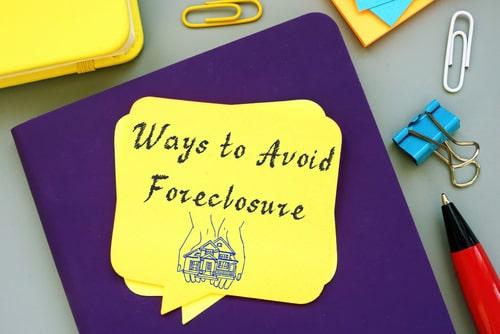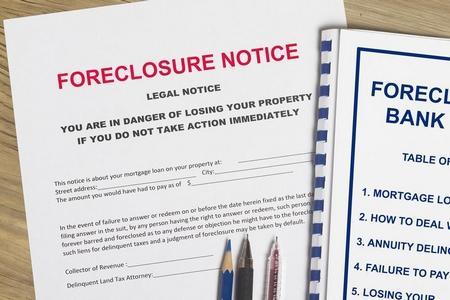1512 Artaius Parkway, Suite 300,
Libertyville, IL 60048
Call for a FREE Phone Consultation
847-549-0000
Video Consultations Also Available
 Spanish
SpanishServing Clients Across 7 Illinois Locations
Recent Blog Posts
Top Tips for Avoiding a Home Foreclosure in Illinois
 Buying a home can be a dream come true for many people. Even if you worked hard and saved a substantial amount for a down payment, you will likely still need to take out a loan, which is known as a mortgage. If you fail to make your monthly mortgage payments, you could be at risk of losing your house. Foreclosure is the legal process by which the lender or bank can repossess your house. This means you will have to vacate the premises within a certain amount of time.
Buying a home can be a dream come true for many people. Even if you worked hard and saved a substantial amount for a down payment, you will likely still need to take out a loan, which is known as a mortgage. If you fail to make your monthly mortgage payments, you could be at risk of losing your house. Foreclosure is the legal process by which the lender or bank can repossess your house. This means you will have to vacate the premises within a certain amount of time.
If your house is worth less than the amount you owe on your loan, a deficiency judgment may be entered. Not only do you lose your home, but you may owe your lender additional money to make up the difference in value, and your credit score will go down. The global coronavirus pandemic has impacted many homeowners financially. Fortunately, there are ways you can avoid going through foreclosure.
How Can Forensic Loan Auditing Help My Illinois Foreclosure Case?
 Buying your first home can be exciting, but it can also be overwhelming to take on such a major responsibility. Regardless if you are single or married, it is important to carefully consider your mortgage and what you can afford in terms of a loan. During the COVID-19 pandemic, many people have been furloughed or laid off from their jobs for an indefinite period of time. Although they may be entitled to unemployment, those funds may not cover their monthly mortgage payment. The federal government has issued protections for tenants and mortgage loan borrowers under the Coronavirus Aid, Relief, and Economic Security (CARES) Act. However, once this moratorium expires, home owners may still be struggling to keep afloat financially if they cannot return to work. Forensic loan auditing can help reveal any violation of the law with regard to the loan package. An experienced attorney can help determine if this specific type of auditing can help in your foreclosure defense.
Buying your first home can be exciting, but it can also be overwhelming to take on such a major responsibility. Regardless if you are single or married, it is important to carefully consider your mortgage and what you can afford in terms of a loan. During the COVID-19 pandemic, many people have been furloughed or laid off from their jobs for an indefinite period of time. Although they may be entitled to unemployment, those funds may not cover their monthly mortgage payment. The federal government has issued protections for tenants and mortgage loan borrowers under the Coronavirus Aid, Relief, and Economic Security (CARES) Act. However, once this moratorium expires, home owners may still be struggling to keep afloat financially if they cannot return to work. Forensic loan auditing can help reveal any violation of the law with regard to the loan package. An experienced attorney can help determine if this specific type of auditing can help in your foreclosure defense.
What Is the Difference Between a Loan Modification and Refinancing?

Are you having a difficult time making your monthly mortgage payment? If so, the first thing you need to know is that you are not alone. At any given time, thousands of homeowners are encountering situations in which they have trouble meeting their mortgage obligations, and for a myriad of reasons. For many homeowners, 2020 has been especially difficult, as the economic impact of the COVID-19 health crisis continues to cause problems even now.
If you are struggling with your current mortgage payment, you have a few options. Two of the most common are refinancing your loan or modifying your existing loan. Loan modification and a refinance might seem similar at first glance, but they have very important differences that you need to keep in mind.
Refinancing Your Home
How to Handle a Loan Modification Denial in Illinois
 Across the country, moratoriums have been placed on eviction and foreclosure proceedings as a result of the COVID-19 crisis. At the end of August, the Federal Housing Finance Agency (FHFA) announced that it was extending the foreclosure moratorium for federally-backed single-family home mortgages until the end of the year at the earliest. The moratorium was set to expire on August 31, but the FHFA recognized that many homeowners still face serious struggles when it comes to making their mortgage payments. While non-federally-backed mortgages are not directly affected by the moratorium, most private lenders have followed suit and are holding off on foreclosure proceedings for the time being.
Across the country, moratoriums have been placed on eviction and foreclosure proceedings as a result of the COVID-19 crisis. At the end of August, the Federal Housing Finance Agency (FHFA) announced that it was extending the foreclosure moratorium for federally-backed single-family home mortgages until the end of the year at the earliest. The moratorium was set to expire on August 31, but the FHFA recognized that many homeowners still face serious struggles when it comes to making their mortgage payments. While non-federally-backed mortgages are not directly affected by the moratorium, most private lenders have followed suit and are holding off on foreclosure proceedings for the time being.
If you have fallen behind on your mortgage due to difficulties caused by the COVID-19 lockdown, you are probably not going to face foreclosure in the immediate future. You will, however, need to get caught up, as foreclosure will be a possibility at some point down the road. In order to bring your mortgage current, you will most likely need to request a loan modification. Most lenders are willing to work with borrowers who ask for a loan modification, but the application process can be challenging and confusing. In fact, it is not at all uncommon for a borrower’s first request to be denied. The good news is that a loan modification denial is not the end of the story.
Should I Ask for a Loan Modification If I Am Behind on My Mortgage?
 Have you missed a few mortgage payments because of COVID-19 or for any other reason? If so, you might be inching ever closer to defaulting on your loan, which means that foreclosure could soon become a possibility. While many lenders—including most federally sponsored lending programs—put a moratorium on foreclosures during the COVID-19 health crisis, these moratoriums will soon be coming to an end. With this in mind, you will need to address any payments that you might have skipped, regardless of the reasons.
Have you missed a few mortgage payments because of COVID-19 or for any other reason? If so, you might be inching ever closer to defaulting on your loan, which means that foreclosure could soon become a possibility. While many lenders—including most federally sponsored lending programs—put a moratorium on foreclosures during the COVID-19 health crisis, these moratoriums will soon be coming to an end. With this in mind, you will need to address any payments that you might have skipped, regardless of the reasons.
The good news is that you will almost certainly have options that can help you get your loan back in good standing so that you can keep your home. One of the most common of these options is a loan modification, and an experienced Libertyville attorney can help you with your application.
Could Now Be a Good Time to Buy an REO Property?

As the Chicago region begins to emerge from the lockdown caused by the COVID-19 pandemic, the housing market is flooded with prospective buyers looking to get a great deal on their next home. If you are searching for a new house, family members and friends may have suggested the possibility of buying a foreclosure property. A foreclosure property is real estate—in this case, a home—that is for sale by a lender because the current owner defaulted on the mortgage. Most defaults and foreclosures are caused by a failure to make the required payments.
A foreclosure sale is usually an auction, which means that it is possible to score a great deal, depending on the condition of the property. If a foreclosure property is put up for auction but not sold, the property reverts back to the bank and becomes a “real-estate owned” or REO property.
IL Offers Help to Homeowners as Foreclosure Moratorium is Extended
 In March of this year, the U.S. Department of Housing and Urban Development (HUD) issued a moratorium on foreclosures for all single-family mortgages insured by the Federal Housing Administration (FHA). The moratorium was in response to the anticipated financial effects of the COVID-19 pandemic on households across the country. The move was shortly followed by a similar directive from the Federal Housing Financial Agency (FHFA), which ordered the Federal National Mortgage Association (Fannie Mae) and the Federal Home Loan Mortgage Company (Freddie Mac) to suspend foreclosures for at least 60 days.
In March of this year, the U.S. Department of Housing and Urban Development (HUD) issued a moratorium on foreclosures for all single-family mortgages insured by the Federal Housing Administration (FHA). The moratorium was in response to the anticipated financial effects of the COVID-19 pandemic on households across the country. The move was shortly followed by a similar directive from the Federal Housing Financial Agency (FHFA), which ordered the Federal National Mortgage Association (Fannie Mae) and the Federal Home Loan Mortgage Company (Freddie Mac) to suspend foreclosures for at least 60 days.
Shortly thereafter, federal lawmakers passed the Coronavirus Aid, Relief, and Economic Security (CARES) Act to provide financial assistance to millions of American families. In the months that followed, the foreclosure moratoriums were extended several times. Though they are set to end on August 31, 2020, in Chicago, Gov. Pritzker has extended the moratorium to last an additional 30 days. However, the financial assistance offered by the CARES Act already expired earlier this month, leaving many Illinois residents wondering if there is any other help available.
4 Common Mistakes Homeowners Make When Facing Foreclosure
 Even if you have never owned your own home before and do not have a track record of missed payments, the failure to make mortgage payments will eventually lead your lender to file for foreclosure. Foreclosure is the legal process through which a lender can seize a home from a borrower who has failed to live up to his or her obligations set forth by the mortgage agreement. While there are other violations that could lead to foreclosure, the overwhelming majority of foreclosure filings are prompted by the borrower failing to make payments.
Even if you have never owned your own home before and do not have a track record of missed payments, the failure to make mortgage payments will eventually lead your lender to file for foreclosure. Foreclosure is the legal process through which a lender can seize a home from a borrower who has failed to live up to his or her obligations set forth by the mortgage agreement. While there are other violations that could lead to foreclosure, the overwhelming majority of foreclosure filings are prompted by the borrower failing to make payments.
The foreclosure process can be intimidating and extremely challenging for the average homeowner. It is very easy to make mistakes under such confusing circumstances, and a single error could end up costing you thousands of dollars. If you are behind on your mortgage, and foreclosure is looming, be sure to avoid these common mistakes that many homeowners make.
What You Should Know About Buying a Home During COVID-19
 Over the last few months, the lockdown and the slow reopening caused by the COVID-19 pandemic forced many families to spend countless days and weeks in close proximity to one another. In many cases, the extra family time has been a blessing. In others, the time together served as a notice that the family home is starting to feel a bit small—or perhaps a little too big. If you are in the latter group, you may be thinking that it is time to start looking for your next home. Or, maybe you were already in the market for a new home before the pandemic started. Either way, now could be a good time to buy a house, despite the challenges presented by the “new normal.”
Over the last few months, the lockdown and the slow reopening caused by the COVID-19 pandemic forced many families to spend countless days and weeks in close proximity to one another. In many cases, the extra family time has been a blessing. In others, the time together served as a notice that the family home is starting to feel a bit small—or perhaps a little too big. If you are in the latter group, you may be thinking that it is time to start looking for your next home. Or, maybe you were already in the market for a new home before the pandemic started. Either way, now could be a good time to buy a house, despite the challenges presented by the “new normal.”
Is It a Seller’s Market?
Many real estate experts suggest that this vague period of reopening after COVID-19 is shaping up to be a seller’s market in the residential real estate industry. The last few months have offered many would-be sellers the chance to tackle projects that they have been putting off, in some cases, for years. By finishing such projects, prospective sellers have been able to add substantial value to their homes, which is likely to be reflected in the asking price.
Should I Sell My Home During the COVID-19 Crisis?
 Selling a home is one of the biggest financial decisions a person can make in their lifetime. The process can already be complicated if the seller is buying a home at the same time, having to relocate by a certain date, or if the seller is downsizing because of trouble making mortgage payments. The COVID-19 crisis adds complicating factors, from uncertainty about the real estate market in the future, leading sellers to accept low offers quickly; to concerns about strangers walking in and out of the seller’s home, creating personal safety concerns.
Selling a home is one of the biggest financial decisions a person can make in their lifetime. The process can already be complicated if the seller is buying a home at the same time, having to relocate by a certain date, or if the seller is downsizing because of trouble making mortgage payments. The COVID-19 crisis adds complicating factors, from uncertainty about the real estate market in the future, leading sellers to accept low offers quickly; to concerns about strangers walking in and out of the seller’s home, creating personal safety concerns.
There is no definitive answer to the question of whether or not you should move forward with the sale of your home during the COVID-19 crisis. As you weigh the pros and cons of selling your home, remember the best decision you can make includes hiring an experienced real estate attorney before you make a decision about listing your home. In the Lake County area, our attorneys can talk you through the pros and cons of selling during these unprecedented times and will likely have insights into concerns you were unaware of.
 Stop Foreclosure
Stop Foreclosure
















